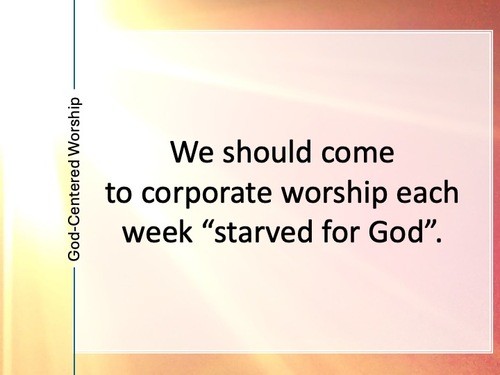Corporate Worship
Chapter 6 of The Dangerous Duty of Delight focuses in on the implications of Christian Hedonism (our call to find our greatest delight and satisfaction in God) for worship. As we noted in our last post, true worship must be an act of delighting in God. John Piper puts it well: "Worship is nothing less than obedience to the command of God, 'Delight yourself in the LORD” (Psalm 37:4).'" Today we look at three implications that has for corporate worship.
(1) "The true diagnosis of weak worship is not that we are coming to get and to give." Rather, "people ought to come to corporate worship services to get." But here is the key: it is what people come to get that matters. We ought to come "starved for God." That is, we should come to corporate worship to get God. (Psa 42:1)
(2) "Seeing the essence of worship as satisfaction in God will make corporate worship radically God-centered." What we are fighting against here is not making worship centered on us, self-centered/man-centered. As Piper notes, "If the focus shifts onto our giving to God, instead of His giving Himself to us, one result is that subtly it is not God who remains at the center but, instead, the quality of our giving." We must evaluate our worship not in terms of how "excellent" it is in the sense of how polished it is; we must evaluate our worship in terms of how excellent it is in the sense of how much it exalts God and draws our hearts to Him (and sometimes that is unpolished and messy).
(3) "The essential heart-act of worship [is] an end in itself." That is, we do not worship so that we can get something else from God. We worship because what we want is God, no matter what else we do or do not get. As Piper notes, "You simply can’t say to God, 'I want to be satisfied in You so that I can have something else.' Because that would mean that you are not really satisfied in God but in that something else. And that would dishonor God, not worship Him."
So as we come to worship together each week, we should come with the desire to delight and be satisfied in God and Him alone -- not in the quality of experience, not in the polish of the service, not what we might get from God, but God.
(1) "The true diagnosis of weak worship is not that we are coming to get and to give." Rather, "people ought to come to corporate worship services to get." But here is the key: it is what people come to get that matters. We ought to come "starved for God." That is, we should come to corporate worship to get God. (Psa 42:1)
(2) "Seeing the essence of worship as satisfaction in God will make corporate worship radically God-centered." What we are fighting against here is not making worship centered on us, self-centered/man-centered. As Piper notes, "If the focus shifts onto our giving to God, instead of His giving Himself to us, one result is that subtly it is not God who remains at the center but, instead, the quality of our giving." We must evaluate our worship not in terms of how "excellent" it is in the sense of how polished it is; we must evaluate our worship in terms of how excellent it is in the sense of how much it exalts God and draws our hearts to Him (and sometimes that is unpolished and messy).
(3) "The essential heart-act of worship [is] an end in itself." That is, we do not worship so that we can get something else from God. We worship because what we want is God, no matter what else we do or do not get. As Piper notes, "You simply can’t say to God, 'I want to be satisfied in You so that I can have something else.' Because that would mean that you are not really satisfied in God but in that something else. And that would dishonor God, not worship Him."
So as we come to worship together each week, we should come with the desire to delight and be satisfied in God and Him alone -- not in the quality of experience, not in the polish of the service, not what we might get from God, but God.

